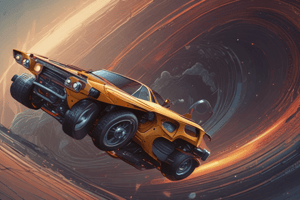Podcast
Questions and Answers
Which of the following scenarios demonstrates a non-contact force?
Which of the following scenarios demonstrates a non-contact force?
- A student pushing a book across a desk.
- A car's tires experiencing friction against the road.
- A carpenter hammering a nail into a piece of wood.
- An apple falling from a tree due to gravitational attraction. (correct)
A box rests on an inclined plane. At what angle will static friction be overcome, initiating the box starts to slide down the plane?
A box rests on an inclined plane. At what angle will static friction be overcome, initiating the box starts to slide down the plane?
- When the component of gravitational force parallel to the plane exceeds the maximum static friction force. (correct)
- When the angle of the inclined plane is zero degrees.
- When the normal force equals the weight of the box.
- When the component of gravitational force perpendicular to the plane exceeds the maximum static friction force.
How does increasing the distance between two objects affect the gravitational force between them?
How does increasing the distance between two objects affect the gravitational force between them?
- It increases the gravitational force exponentially.
- It decreases the gravitational force according to an inverse square relationship. (correct)
- It decreases the gravitational force linearly.
- It increases the gravitational force linearly.
An astronaut has a mass of 55kg. Their weight is measured on Earth and then again on the Moon, where gravity is weaker. Which of the following statements is correct?
An astronaut has a mass of 55kg. Their weight is measured on Earth and then again on the Moon, where gravity is weaker. Which of the following statements is correct?
Which type of friction is most effective at slowing down the motion of a submarine moving through water?
Which type of friction is most effective at slowing down the motion of a submarine moving through water?
A heavy box is easier to push once it is already moving compared to when it is stationary. This is because:
A heavy box is easier to push once it is already moving compared to when it is stationary. This is because:
Two objects with different masses are dropped simultaneously from the same height in a vacuum. Which object will hit the ground first, assuming air resistance is negligible?
Two objects with different masses are dropped simultaneously from the same height in a vacuum. Which object will hit the ground first, assuming air resistance is negligible?
How does air resistance affect the gravitational force acting on a falling object?
How does air resistance affect the gravitational force acting on a falling object?
A car is traveling at a constant velocity. What can be said about the forces acting upon the car?
A car is traveling at a constant velocity. What can be said about the forces acting upon the car?
What is the relationship between mass and gravitational force?
What is the relationship between mass and gravitational force?
Flashcards
Force
Force
A push or pull on an object, measured in Newtons (N).
Contact Force
Contact Force
A force that requires direct contact between objects.
Non-Contact Force
Non-Contact Force
A force that acts between objects even when they are not touching.
Friction
Friction
Signup and view all the flashcards
Static Friction
Static Friction
Signup and view all the flashcards
Sliding Friction
Sliding Friction
Signup and view all the flashcards
Fluid Friction
Fluid Friction
Signup and view all the flashcards
Gravity
Gravity
Signup and view all the flashcards
Mass
Mass
Signup and view all the flashcards
Weight
Weight
Signup and view all the flashcards
Study Notes
- How forces change the motion of an object is the big idea
- Chapter 2 discusses gravity and friction
- Chapter 19 discusses electric forces
- Chapter 20 discusses magnetic forces
- Electric and magnetic forces are discussed in stemscopes
- Gravitational forces are discussed in stemscopes
Gravity and Friction
- Contact and non-contact forces are key concepts
- The law of universal gravitation should be understood
- How friction impacts the motion of sliding objects is important
Types of Forces
- A force is a push or pull on an object
- Forces are measured in newtons (N)
- Two types of forces exist: contact and non-contact
Contact Force
- Involves a push or pull on an object by another, requiring physical touch
- Examples include pushing a container, pressing on computer keys, and experiencing friction
Non-Contact Force
- Is a push or pull on an object by another without physical touch
- Examples are gravity, magnetism, and electrical forces
Types of Friction
- Friction resists the motion of touching objects
- Static friction prevents objects from sliding past each other
- Sliding friction opposes sliding motion between objects
- Fluid friction occurs between a surface and a fluid like water or air, such as air resistance
Static Friction
- Is shown when an applied force of 100N is meet by a Static Friction of -100N giving a Net Force of 0N
Sliding Friction
- Is shown when an applied force of 200N is meet by a Sliding Friction of -70N giving a Net Force of 130N
Gravity
- Gravity is an attractive force between objects with mass
- Mass is the amount of matter in an object
- The more massive the objects, the greater the gravitational pull between them
Distance
- The greater the distance between objects, the less the gravitational pull
Weight
- Weight is impacted by gravity
- An astronaut weighs 539N and has a mass of 55kg on Earth
- The weight of an astronaut on the moon would change but their mass would not
- (F=ma)
Static Charge
- Is an unbalanced positive or negative charge on an object
- Opposite charges attract
- Same charges repel
Variables that affect Electric Charge
- The amount of charge: more charge equals greater electrical force
- Distance: more distance equals less electrical force
Magnetism
- A magnet attracts iron metal
- A magnetic pole is where the force applied by a magnet is strongest
- Opposite poles attract each other
- Like poles repel each other
Variables that affect Magnetic Strength
- Include the size of the magnet
- Shorter distances between magnets result in a stronger the magnetic force
Studying That Suits You
Use AI to generate personalized quizzes and flashcards to suit your learning preferences.
Related Documents
Description
Explore contact and non-contact forces, including gravity, friction, magnetism, and electrical forces. Grasp the law of universal gravitation and the impact of friction on sliding objects. Learn how forces, measured in newtons, alter object motion.




